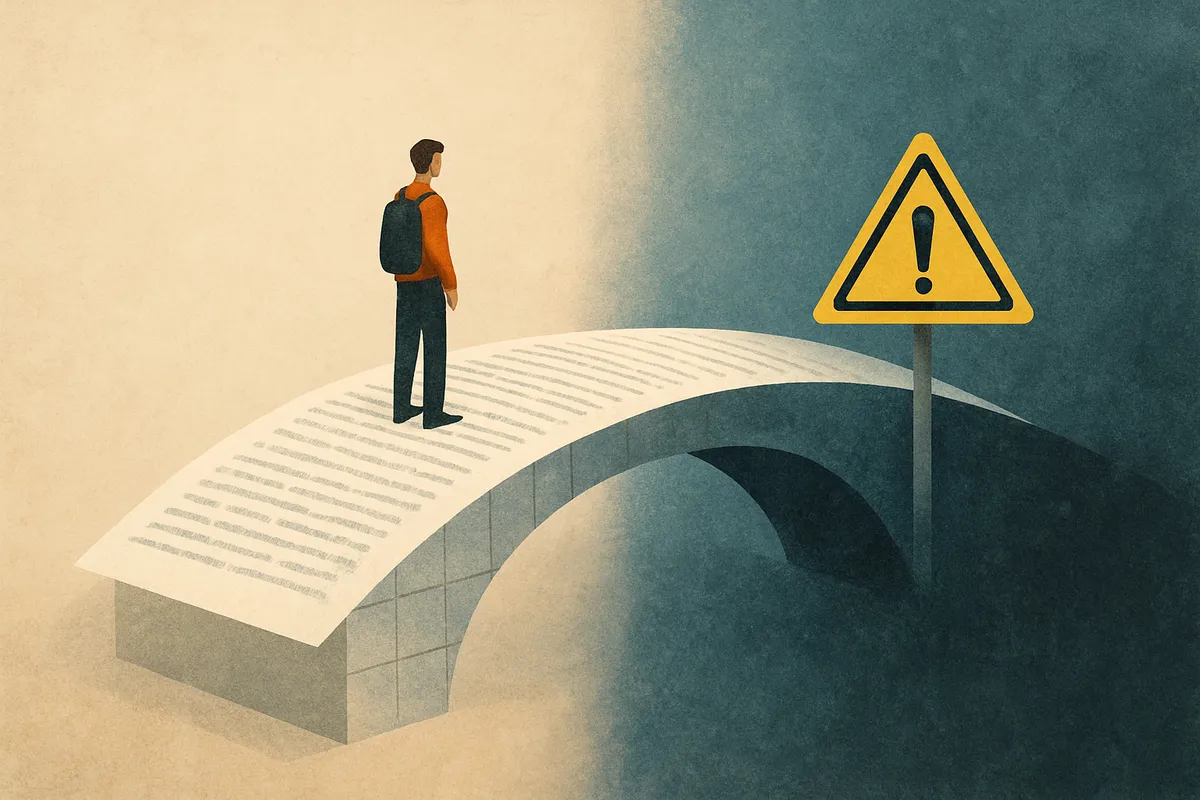When Inclusion Punishes Its Own Tools — and the Autistic People Who Use Them
 How a university’s promise of access turned into a system of suspicion
How a university’s promise of access turned into a system of suspicion
The Bridge That Became a Toll
They built a bridge for autistic students — and then called it dishonesty to use it.
New England's Daily Voice is reporting that Orion Newby, a freshman at Adelphi University, joined the school’s Bridges to Adelphi program for autistic students. He paid extra for tutoring and writing support. The same university that promised inclusion later accused him of using AI to cheat — because his writing had become too fluent.
The accusation began with his professor, who cited a “100% AI score” from Turnitin — a tool still notorious for false positives. Newby provided evidence that his essay was human-written and asked for the report but never received it. The university accepted the professor’s claim and upheld the charge without review.
The lawsuit now moving through the courts says what the institution refused to: that this was discrimination, not due process at all.
When Accommodation Becomes Ammunition
Programs like Bridges to Adelphi are marketed as pathways — structures meant to help autistic students navigate systems not built for them. But for Newby, that bridge became a trap. The same grammar help he was encouraged to use was recast as evidence of deception. His access tools were treated as contraband.
This is not an administrative mistake. It’s a worldview. Support is tolerated only as long as it produces familiar outcomes. When autistic effort begins to resemble fluency, institutions label it counterfeit. Success, once visible, becomes suspicious.
The Missing Tutor
The lawsuit notes that Newby’s grammar tutor — part of the Bridges program he paid for — was never included in the investigation. No statement. No interview. No recognition of their role. The person whose labor made the improvement possible vanished from the record the moment their presence complicated the narrative.
That omission matters. The tutor represents the human side of accommodation — the relational scaffolding universities love to market and quickly discard. When things go wrong, the system erases its own intermediaries to preserve institutional innocence. Institutions protect their image by silencing the people who reveal how access actually works.
The Machine Didn’t Invent the Bias — It Scaled It
Turnitin didn’t create this logic. It industrialized it. The professor’s faith in a “100% AI score” worked only because bias was already there — the presumption that autistic communication cannot be both capable and authentic. The algorithm didn’t detect AI. It detected the failure to conform to a neurotypical template.
Automation bias made the suspicion efficient. It gave prejudice a digital veneer: numbers, dashboards, workflows. The human error was not trusting a tool. It was trusting what that tool conveniently confirmed.
The Closed Loop
Look closer and the pattern forms a loop. The accessibility system trained him to meet the expectations of academic English. The surveillance system then punished him for meeting them too well. Different tools. Same logic. Teach conformity, then criminalize it.
That is not access. That is containment disguised as support — a structure that disciplines difference and sells inclusion as product.
What the Algorithm Erased
This case is not about a single misused tool. It is about who gets believed when technology speaks. When a neurotypical standard is hard-coded into detection software, autistic expression becomes an anomaly to be flagged. The institution doesn’t have to intend harm. It just has to obey the output.
When inclusion relies on automation, the result is predictable. Autistic students must either remain visibly different and risk failure or adapt too well and risk accusation. Authenticity itself becomes the crime.
The Real Question
What kind of inclusion requires autistic students to sound less like themselves to be accepted — and then punishes them for succeeding?
Until universities learn the difference between accommodation and suspicion, every autistic student will be writing under surveillance, waiting for the day their own voice is flagged as impossible.